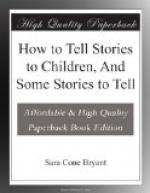The expression must, however, always remain suggestive rather than illustrative. This is the side of the case which those who are over-dramatic must not forget. The story-teller is not playing the parts of his stories; he is merely arousing the imagination of his hearers to picture the scenes for themselves. One element of the dual consciousness of the tale-teller remains always the observer, the reporter, the quiet outsider.
I like to think of the story-teller as a good fellow standing at a great window overlooking a busy street or a picturesque square, and reporting with gusto to the comrade in the rear of the room what of mirth or sadness he sees; he hints at the policeman’s strut, the organ-grinder’s shrug, the schoolgirl’s gaiety, with a gesture or two which is born of an irresistible impulse to imitate; but he never leaves his fascinating post to carry the imitation further than a hint.
The verity of this figure lies in the fact that the dramatic quality of story-telling depends closely upon the clearness and power with which the story-teller visualises the events and characters he describes. You must hold the image before the mind’s eye, using your imagination to embody to yourself every act, incident and appearance. You must, indeed, stand at the window of your consciousness and watch what happens.
This is a point so vital that I am tempted to put it in ornate type. You must see what you say!
It is not too much, even, to say, “You must see more than you say.” True vividness is lent by a background of picture realised by the listener beyond what you tell him. Children see, as a rule, no image you do not see; they see most clearly what you see most largely. Draw, then, from a full well, not from a supply so low that the pumps wheeze at every pull.
Dramatic power of the reasonably quiet and suggestive type demanded for telling a story will come pretty surely in the train of effort along these lines; it follows the clear concept and sincerity in imparting it, and is a natural consequence of the visualising imagination.
It is inextricably bound up, also, with the causes and results of the quality which finds place in my final injunction, to tell your story with zest. It might almost be assumed that the final suggestion renders the preceding one superfluous, so direct is the effect of a lively interest on the dramatic quality of a narration; but it would not of itself be adequate; the necessity of visualising imagination is paramount. Zest is, however, a close second to this clearness of mental vision. It is entirely necessary to be interested in your own story, to enjoy it as you tell it. If you are bored and tired, the children will soon be bored and tired, too. If you are not interested your manner cannot get that vitalised spontaneity which makes dramatic power possible. Nothing else will give that relish on the lips, that




